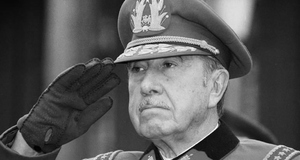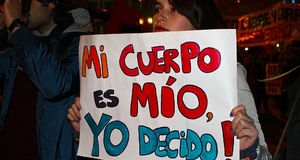"Pressing Disengagement:" Chile's Transition to Democracy After Augusto Pinochet's 1973 Military Coup
By
2012, Vol. 4 No. 09 | pg. 3/3 | « Not long after the Franja Electoral began, the “Yes” campaign sabotaged the “No” campaign because it was clear that the latter’s utopian depiction of Chile would easily win. The “No” campaign had it's programming timeslots switched-around at the last-minute, which made it harder for viewers to find out which timeslot it was campaigning on. The “No” campaign was placed on late timeslots around 10:45-11:15pm with the hopes that most citizens would be asleep by that time. Likewise, the “Yes” campaign broke the rules by disguising the paid programming as being unpaid (Collins, 674). However, this perceived-impediment actually helped the “No” campaign. Since this timeslot captured a smaller audience, “No” had a greater incentive to create a higher-quality production compared to the “Yes” (Collins, 674-675). Inevitably, this higher-quality programming, combined with it's real-world testimony, appealed more to nighttime viewers than the monotonous propaganda of the “Yes” campaign (Collins, 674-675). In October 1988, the results of the plebiscite showed that the “No” campaign had succeeded in coaxing voters to vote against Pinochet. As mandated by Pinochet’s own 1980 Constitution, he was forced to call an election to elect a Presidential successor. The 1989 election was noted for being a fair and accurate election, a far cry from the travesties perpetrated by Pinochet’s regime (Dow, 61). On December 14, 1989, Christian Democrat Patricio Aylwin won 55.2% of the popular vote and subsequently became the first democratically elected president of Chile in nearly 20 years” (Dow, 62). More importantly, however, Chile was able to resume a democratic tradition dating from the first-half of the 19th century—a unique trait among contemporary Latin American countries today (Weeks, 729). One of the first Presidential acts of Patricio Aylwin was the investigation of Pinochet’s 1978 amnesty law, leading the administration to conclude that only corrupt individuals—as opposed to the military as a whole under Pinochet—would be responsible (Dow, 63-64). However, due to the Constitutional Organic Law of Congress, Pinochet himself could not be implicated on any crimes prior to the end of his Presidency on March 11, 1990 (Weeks 725-728). In any case, Aylwin quickly realized that the mission of his Presidency was not to pursue Pinochet himself. Rather, he had to rebuild the damages caused by the corrupt regime, which included a battered-economy and a generally-frightened Chilean public.By all accounts, Aylwin’s presidency was successful in regenerating the economy, reducing poverty and increasing civil liberties (Navia, 302). In 1991, he helped to promulgate the "Rettig Report,” which concluded that 2,279 cases of execution or disappearance were perpetrated mostly by Pinochet’s state agents (Collins, 72). This massive document was a key factor leading to Pinochet’s arrest in London on March 10, 1998—the same day that his term as commander of Chile’s military forces expired— for further implications on human rights violations. However, Pinochet did not live long enough to be formally-prosecuted. Instead, he died in December 2006 at the age of 91. ConclusionIf he [Pinochet] is innocent, let him prove it in a democratic court, one of those that a long time ago ceased to exist in Chile. If in Chile we are not capable of judging those who have destroyed the law or have rewritten the law to their own liking (that is not the same but it has the same effect) we will allow other countries to show us what justice is. Being democratic means always accepting the truth, no matter how hard it is. Only the truth will make us free (Tanner, 395). —A former political prisoner upon hearing of Pinochet’s March 1998 arrest in London The “No” campaigns strategically-effective use of television media completely re-wrote the rules of hegemony. It was not constructed from the “grass tops,” since Pinochet’s regime had virtually destroyed most of Chile’s national identity. Instead, the “No” campaign was a “grassroots” campaign, grown from a disaffected citizenry. Although their monetary resources were initially-limited, their passionate pursuit for justice quickly won allies, such as the U.S. and the Archdiocese of Santiago. The “No” campaign offers a unique examination of Chile’s transition to democracy through the lens of television media. The campaign’s testimonials revealed that people were better-off with the government prior to Pinochet coming into power. Although there were numerous disagreements as to how skillfully President Allende’s handled the government, Chileans put aside their differences to upend Pinochet’s regime. Likewise, the “No” campaign differed from Pinochet’s “Yes” campaign in that it did not threaten Chileans with violence akin to 1973. Instead, the campaign suggested to the citizens that a better democracy, free of Pinochet’s repressively-violent regime, was not difficult to build at all. ReferencesBernath-Plaistad, S and Rennebohm, M. (2008). Chileans overthrow Pinochet regime, 1983-1988. Retrieved from http://nvdatabase.swarthmore.edu/content/chileans-overthrow-pinochet-regime-1983-1988. Byman, D. and Pollack, K. (2001). Let Us Now Praise Great Men: Bringing the Statesman Back In. International Security. 25 (4), 107-146. Collins, C. (2006). Grounding Global Justice: International Networks and Domestic Human Rights Accountability in Chile and El Salvador. Journal of Latin American Studies. 38, 711-738. Crofts-Wiley, S.B. (2006). Assembled Agency: Media and Hegemony in the Chilean Transition to Civilian Rule. Media, Culture & Society. 28 (5), 671-693. Davis, M.P. “Accountability and World Leadership: Impugning Sovereign Immunity.” The University of Illinois Law Review. (1999): 1357-1381. de-Brito, A.B. (1998). Getting Away with Murder? The World Today. 54 (12), 300-302. Dow, J.K. (1998). A Spatial Analysis of the 1989 Chilean Presidential Election. Electoral Studies. 17 (1), 61-76. Gilpin, R. (2008). “Hegemonic War and International Change.” In Conflict After the Cold War (pp. 94-104). New York: Pearson. Jervis, R. (1985). From Balance to Concert: A Study of International Security Cooperation. World Politics. 38 (1), 58-79. Ma, S.Y. (1999). The Rise and Fall of Bureaucratic-Authoritarianism in Chile. Studies in Comparative International Development, 51-65. Mansfield, E. and Snyder, J. (2005). Electing to Fight: Why Emerging Democracies Go To War. Cambridge, MA: The MIT Press. Mearsheimer, J. (2001). The Tragedy of Great Power Politics. New York: W.W. Norton & Company. Navia, P. (2010). Living in Actually Existing Democracies: Democracy to the Extent Possible in Chile. Latin American Research Review. 45, 298-328. Novak, A. (2007). Gendering Trauma: Ariel Dorfman’s Narratives of Crisis and Reconciliation. Critique. 48 (3), 295-317. Nunn, F.M. (1985). One Year in the Life of Augusto Pinochet: Gulag of the Mind. The Americas. 42 (2), 197-206. Nye, J. (2004). Soft Power and American Foreign Policy. Political Science Quarterly. 119 (2), 255-270 Schelling, T. (1966). Arms and Influence. New Haven, CT: Yale University Press. Snyder, G. (2009). Deterrence and Defense. InThe Use of Force: Military Power and International Politics(pp. 350-368). Boulder, CO: Rowman & Littlefield. Snyder, G. (2004). One World, Rival Theories.” Foreign Policy. 53-62. Tanner, E. (2001). Chilean Conversations; Internet Forum Participants Debate Augusto Pinochet’s Detention. Journal of Communication. 383-403. Tolbert, S.E. (2001). CHILE. Retrieved from http://www.radford.edu/~mpbaker/553chile.htm. Truman State University. (2012). Authoritarian Rule under Pinochet. Retrieved from http://revolutions.truman.edu/chile/pinochet1.html. Walker, V. (2011). At the End of Influence: The Letelier Assassination, Human Rights, and Rethinking Intervention in US-Latin American Relations. Journal of Contemporary History. 46 (1), 109-135. Weeks, G. (2000). The Long Road to Civilian Supremacy over the Military: Chile 1990-1998. Studies in Comparative International Development. 65-82. Weeks, G. (2000). Waiting for Cincinnatus: The Role of Pinochet in Post-Authoritarian Chile. Third World Quarterly. 21 (5), 725-738. Wyndham, M and Read, P. (2010). From State Terrorism to State Errorism: Post-Pinochet Chile’s Long Search for Truth and Justice. The Public Historian. 32 (1), 31-44. Suggested Reading from Inquiries Journal
Inquiries Journal provides undergraduate and graduate students around the world a platform for the wide dissemination of academic work over a range of core disciplines. Representing the work of students from hundreds of institutions around the globe, Inquiries Journal's large database of academic articles is completely free. Learn more | Blog | Submit Latest in Political Science |














